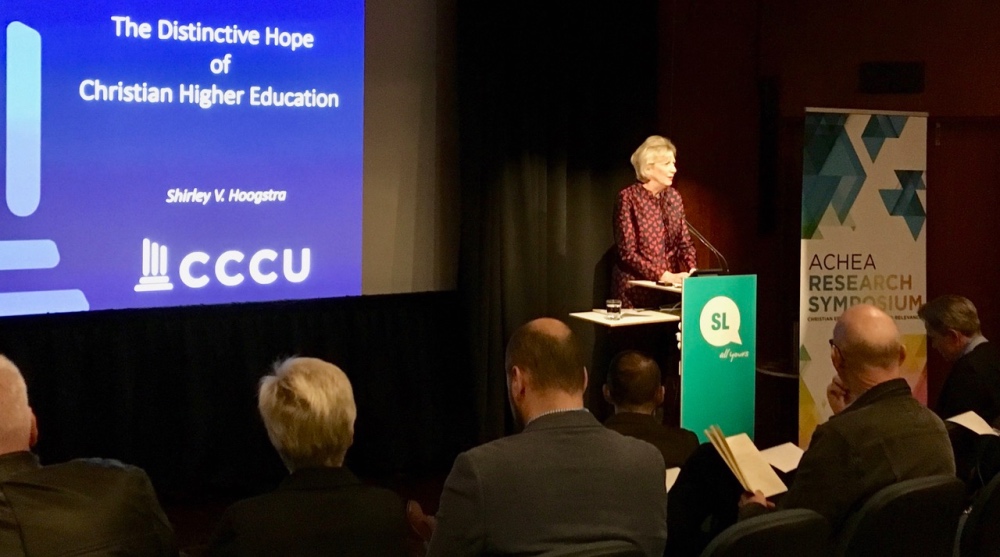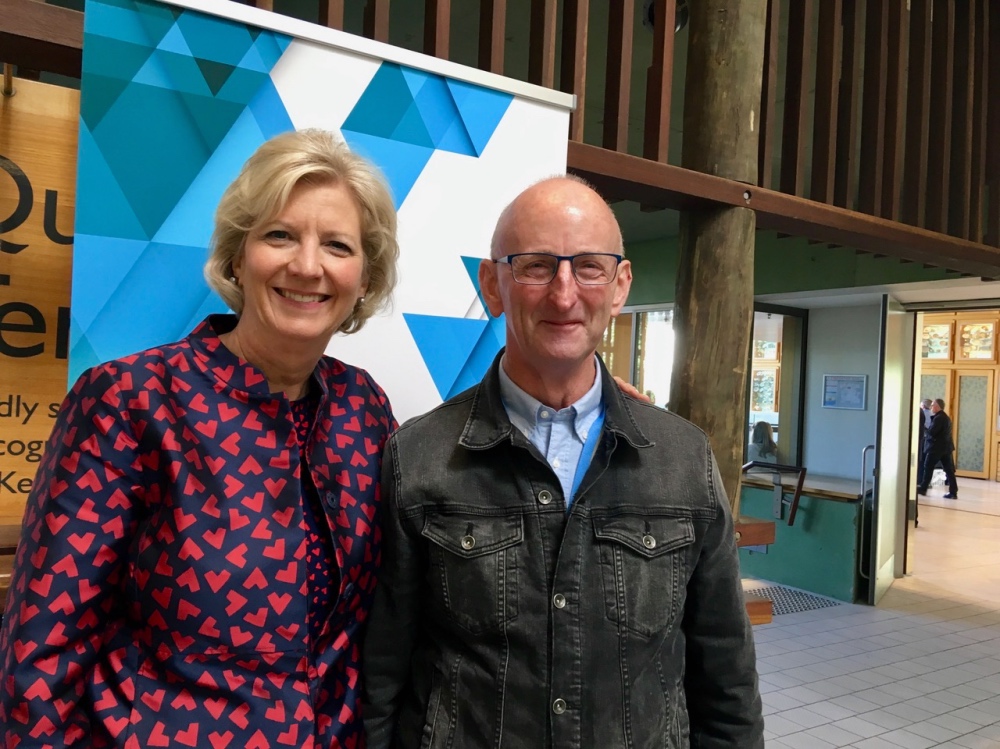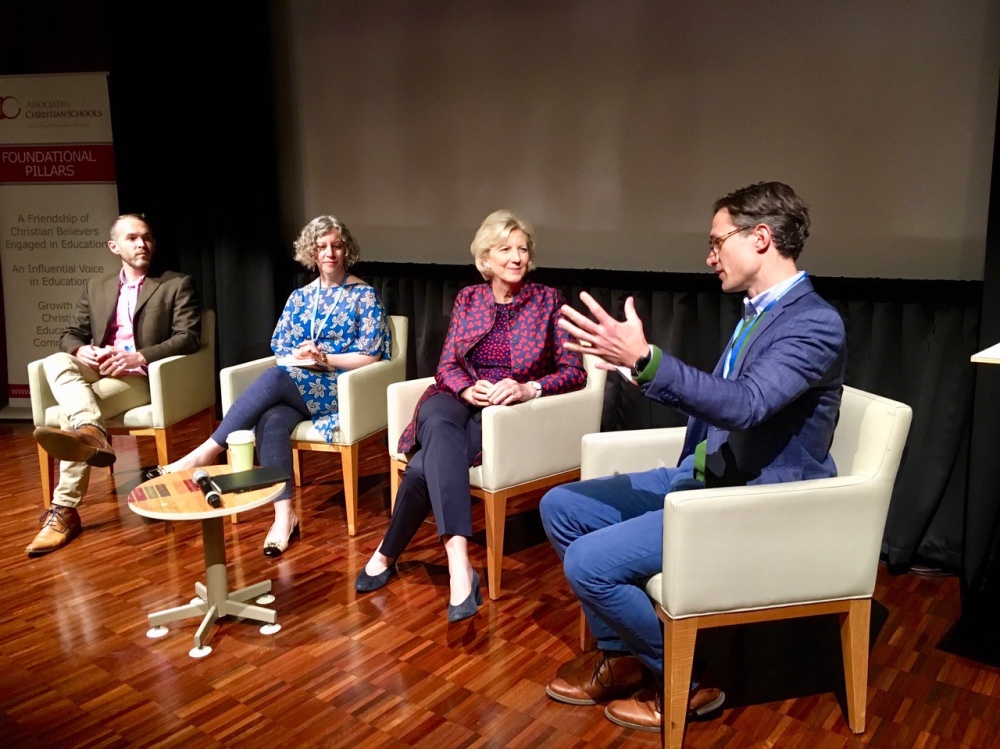
Visiting Australia, Shirley Hoogstra, president of the US-based Council for Christian Colleges and Universities, spoke with CHRISTOPHER GILBERT about the role Christian higher education institutions play in teaching young people how to live out their faith and why she is so committed to bringing such universities and colleges together…
Shirley Hoogstra, president of the Washington, DC-based Council for Christian Colleges and Universities, recently visited three member colleges of the Australian Christian Higher Education Alliance in Sydney – Excelsia, Alphacrucis and Morling colleges – before going on to address the ACHEA conference in Brisbane in response to an invitation from Dr Jeannie Trudel, president of Christian Heritage College.
During her visits to the colleges (and prior to addressing the conference), she spoke to Sight about the role Christian higher education institutions play in teaching young men and women how to live out their faith, how Christian colleges and institutions are “uniquely positioned” to prepare students to tackle the serious problems facing the world, and why she is so committed to bringing such universities and colleges together…
You’ve been president of Council for Christian Colleges and Universities for five years now after many years at Calvin College in Grand Rapids, Michigan, overseeing student life and prior to that a partner in a law firm. What led you to take on a role as president of an organisation with 180 member universities and colleges in 19 countries?
“Next to the church, there’s nothing that’s the hope of the world like Christian higher education. The church has a particular role by the power of Jesus Christ and the Holy Spirit to bring the message of salvation. But it’s Christian higher education that teaches young men and women how to live that out in every single discipline. And that’s where society and culture is changed and enriched. I’m speaking at the ACHEA conference as a product of Christian higher education. I came out of the parent-run schools, K through 12, of Holland, Michigan, and Dutch immigrants. My father was an immigrant, my grandparents were too, and so we [my siblings and I] were the first generation to go to college. We believed that Christian higher education would make a difference in our personal lives and in our family’s lives and then, of course, in the lives of our community. And so for me to be able to represent Christian higher education around the world is a calling I could not have imagined and I’m so grateful for.”

Shirley Hoogstra addresses the Australian Christian Higher Education Alliance in Brisbane. PICTURE: Jo Kadlecek-Gilbert
What is the core commitment of the CCCU colleges and universities that links them across so many countries and cultures?
“Beyond any cultural, historic or linguistic differences, we’re all united in one belief: Education infused with Christian values is essential to the good of the world. Education is never really free of values. We’re unapologetic in our desire to teach students not only the information they need to succeed in the world but also the commitments of the heart. These commitments guide them toward deeply rooted ethics, systemic justice and redemptive service. All our member institutions are [government] accredited, comprehensive colleges and universities whose missions are Christ-centered and rooted in the historic Christian faith.”
Christian higher education, as with secular schools in Western nations, is coming under various pressures in the marketplace of the digital age. How are your member schools positioning themselves for the future?
“In the United States, our first and then best institutions such as Harvard, Princeton and Yale, were founded as Christian colleges and universities. However, over the centuries, that commitment has changed, and in the 21st century, we are increasingly asked to explain what Christian higher education is and how it is relevant in a secular, post-Christian society.
“In the US, families are often focused on career preparation, quick paths to graduation, and an immediate return on their investment of tuition dollars. This approach to higher education mitigates against the Christian university that has higher tuition cost because it isn’t tax funded, and often has extra requirements such as service, study away, and religion courses. If families take a superficial approach to higher education, Christian schools face serious challenges.
“[I]nstitutions that belong to the CCCU share three basic educational commitments: First, we integrate Biblical truth into everything we do from the chapel to the art and dance studio to the classroom. Secondly, we are committed to the moral and spiritual formation of students; and thirdly, we are committed to graduating students who make a difference for the common good as redemptive voices in the world.”
“Chris Hazell, founder of the Call Collective, points out, universities should lead their students in a deep consideration of this question: ‘How are you going to live a meaningful life based on what you now know about the world?’ Only faith-based colleges and universities are committed to helping students answer that question.
“So, institutions that belong to the CCCU share three basic educational commitments: First, we integrate Biblical truth into everything we do from the chapel to the art and dance studio to the classroom. Secondly, we are committed to the moral and spiritual formation of students; and thirdly, we are committed to graduating students who make a difference for the common good as redemptive voices in the world. The institutions represented in ACHEA share these commitments, which we believe are crucial to the health of the world.
“Let me illustrate the need: A 2017 study by the Pew Research Center investigated what people believe gives their lives meaning. The results were startling. The oldest respondents indicated that the centre of meaning for their lives was very personal and close to home. They only found meaning in private endeavors within the closed circle of the family. There was a disturbing decline in the percentage of adults who found meaning in serving the greater good – working against poverty or for the marginal. As David Brooks, author of The Second Mountain: The Search for a Moral Life, explains it, ‘The upper registers of moral life – fighting for freedom, struggling to end poverty – have been amputated for many’.
“The encouraging finding in the Pew research was that younger people still reported finding meaning in helping others and continue to recognise that becoming a better person, a person who seeks the good of the world, is an important vocational goal. Christian colleges and universities are uniquely positioned to prepare them to make the positive contribution they aspire to by working on the serious problems facing us all. Moral development, based on ancient and holy principals is generally outside the scope of secular institutions, and they struggle to meet students’ strong spiritual interests and goals.
“Recognising contemporary society’s crucial need for a moral compass, secular institutions attempt to impart ethics and a commitment to the greater good, but they must do so without the foundation of an absolute set of moral principles. Brooks summarised, ‘You [Christian colleges] have what everybody else is desperate to have…You have a recipe to nurture human beings who have a devoted heart, a courageous mind, and a purposeful soul. Almost no other set of institutions has that, and everyone wants it.’
“And you have five CCCU members offering this in Australia — Alphacrucis College, Avondale College of Higher Education, Christian Heritage College, Eastern College of Australia, and Excelsia College. I am glad to be able to visit with three of them in Sydney and meet the leaders of the others at the symposium in Brisbane.”

Shirley Hoogstra with Professor Stephen Fogarty, president of Alphacrucis College, at the ACHEA conference in Brisbane. PICTURE: Jo Kadlecek-Gilbert
How do you respond to an idea, widespread in Australia, that religious commitment has little to do with learning and that a secular institution is the place to be taught by the best experts in their fields?
“Christian colleges and universities are dedicated to the pursuit of the integration of faith, emotion, and intellect. This begins with the faculty who pursue academic excellence because they see God as the author of all truth. The classroom and the library are as much arenas of Christian integration as the chapel and residence hall. Professors in our colleges – in America and in Australia – commit time, energy, and mental effort to illuminating the ways their disciplines undergird faith. Without fear, Christian college professors open up the big questions of their disciplines while they ground their teaching and their research in a firm commitment to the idea that all truth is God’s truth, and all information flows from his creativity and knowledge.
“When academic material leads students to question what they have always believed about God, faculty members are there to point students to the light -not so that they will believe without mental engagement but so that they will struggle through the questions and emerge stronger.
“Without fear, Christian college professors open up the big questions of their disciplines while they ground their teaching and their research in a firm commitment to the idea that all truth is God’s truth, and all information flows from his creativity and knowledge.”
“Jacob Atem, the CCCU’s young alumnus of the year for 2019 is a great example of this. Jacob earned his BA in pre-medicine from Spring Arbor University, a CCCU member school. He earned a Master of Public Health from Michigan State University and a PhD in environmental and global health from the University of Florida, and he is currently a postdoctoral student at the Center of Humanitarian Health at Johns Hopkins University.
“Atem’s undergraduate degree from a faith-based institution prepared him well, in the technical sense, to pursue the best of graduate education. He can compete with the best medical students in the country, but there is much more to Atem’s story. He is one of the 40,000 children orphaned in the Second Sudanese Civil War. After walking more than 2000 miles with other ‘lost boys’, he lived in a refugee camp in Kenya for nearly nine years prior to coming to the US at age 15. Placed with a foster family in Michigan, he graduated from high school and entered Spring Arbor University where he met a welcoming community of faith. Through their guidance, assistance and love, Atem saw first-hand the integration of faith and learning – in his science classes and in the lives of his faculty mentors.
“Because he had personally seen and experienced the impact of malnutrition and disease, Atem founded the Southern Sudan Healthcare Organization while he was still an undergraduate and raised $US800,000 to build a clinic in his hometown. That clinic now sees 3000 patients a day. In his current role as a post-doctoral student he continues to do work on causes close to his heart: integrating refugees into the national healthcare system and doing research on the cholera epidemic in Yemen. Atem is a scientist, trained among the premier scientists of the US, but he has not found a conflict between science and faith. The deep integration he experienced at Spring Arbor has shown him how to be an instrument of peace in a world whose sorrows he understands all too well.”

Shirley Hoosgtra participates in a panel discussion with, from right to left, Dr Ben Myers of Christian Heritage College, Brisbane, Dr Beth Green of Tyndale University College and Seminary, Toronto Canada, and Dan Paterson Australian Director of Ravi Zacharias Ministries International, Brisbane. PICTURE: Jo Kadlecek-Gilbert
What has been a highlight for you within the CCCU?
“Twelve CCCU universities and colleges in the US offer courses and even degrees within state and federal prisons. I was privileged to attend the graduation ceremonies for Nyack College at Fishkill Correctional Institute in April. It was a bucket list experience for me. And what I witnessed was Matthew chapter 25 in action – ‘I was in prison and you visited me, naked and you clothed me…’ – sick, impoverished, without job skills, without a hope and a future. When I looked at the faces of the graduates I realised this is one way resurrection happens this side of Christ coming again. Families are restored and given a future.”





